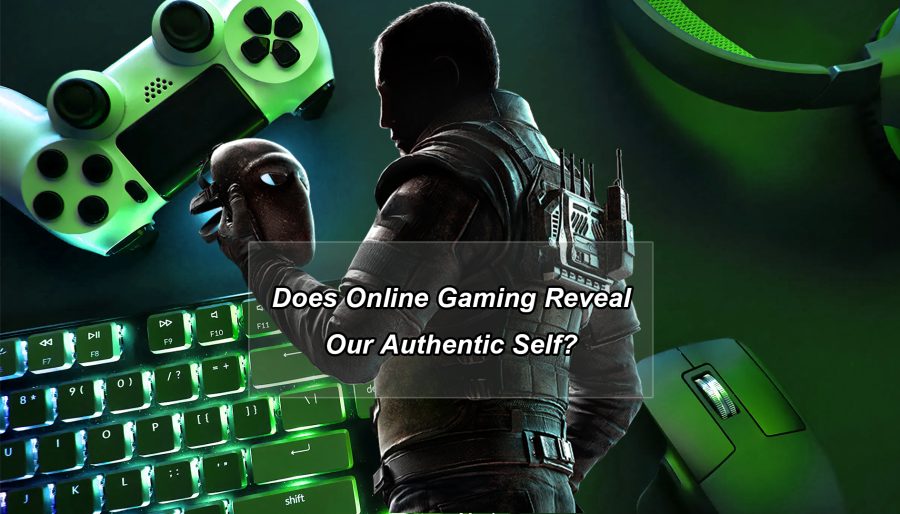Identity is an essential core of who we are as individuals, the conscious experience of the self inside – Gershen Kaufman. Depending on the settings and situation, we manage our impressions to fit the appearance people expect us to have. Think of it as an act; you are on a front stage performing to an audience, expecting positive results and how people view you. There are secrets backstage that you don’t want the audience to know, perfecting your craft to be the ideal person.
Like on the internet, there are many platforms to communicate with people, not only on social media but even in video games. Platforms such as Instagram require you to think about how you want to be presented to a group of people online, like an ideal version of yourself.

You would think of posting about the best moments of your life to make everything seem joyful; of course, people online have no clue what is happening behind the scenes, whether you are struggling or feeling down. It is a concept of being on the front stage, to feel better about yourself by grabbing the attention of others without revealing any downsides of your life. There are many versions of ourselves, our role changes on the location and situation. Is there really an authentic self, or is life just an act? Let’s explore online video games.
Employers check a person’s digital footprint on social media to check your background whether you are qualified, an online presence is crucial for a first impression. Employers can’t trace down any data from online video games. There has been no consequences for people resorting to racism and harassment; this leads to a toxic community in video games due to the anonymity of gaming platforms by setting a different online ID than their real name. It is like showing you backstage persona, revealing your true self with a ‘get away jail free card‘. This happens on a daily occurrence. Unless you are streaming to a big set audience, you act in front of a stage to entertain the viewers on sites such as Twitch.
Examples
I believe this is one of the closest thing to an authentic self. Everyone is different, people play for fun while others play competitively; this is completely normal as it is a part of our identity and how we treat video games. For example, someone could verbally abuse a specific player for not being good enough, our true intentions show and have no filter to cover it; even at home, you still need to respect your parents and family.
TenZ Before Fame
Before TenZ’s fame on Valorant, he was a small Counter-Strike content creator. You can see that there was no filter on what he says, expressing his emotions freely to a small set of audience. In the present day, he stays calm in the world of gaming and streaming to set an example of a role model.
The gaming world is one of the most toxic environments. There is no rule that affects our lives, allowing people the freedom of speech to say both positive and negative things during online gaming. At the end of the day, everyone are just strangers
References:
(Lars Lykaion, 2017, Why Is Gaming Culture So Toxic?) – Online Thread: https://arstechnica.com/civis/threads/why-is-gaming-culture-so-toxic.1404937/
(Juho Kahila, Jaana Viljaranta, Sanni Kahila, Satu Piispa-Hakala, Henriikka Vartiainen, 2022, Gamer rage – ChildrenÔÇÖs perspective on issues impacting losing oneÔÇÖs temper while playing digital games) – https://www.sciencedirect.com/science/article/pii/S2212868922000393#:~:text=Instead%20of%20individual%20reasons%2C%20gamer,inoperable%20technology%20also%20trigger%20outrage.
(Dana Sydorenko, 2023, Toxicity in gaming: unveiling the ‘Closed Club’ and revolutionising cooperative play) – https://www.maddyness.com/uk/2023/12/29/toxicity-in-gaming-unveiling-the-closed-club-and-revolutionising-cooperative-play/
(Julian Frommel, Daniel Johnson, Regan L. Mandryk, 2023, How perceived toxicity of gaming communities is associated with social capital, satisfaction of relatedness, and loneliness) – https://www.sciencedirect.com/science/article/pii/S2451958823000350


Hello Tony, as an e-sports enthusiast, I really like your article. The point of your article is very unique. Most of us would think that people would hide themselves on the Internet to create a new identity, but you think that netizens would reveal their true personalities in the communication on the Internet, which is very interesting. In your article, you cited different attitudes of different people towards games, and in this kind of exciting or toxic community environment, people will not hide but show their real selves. Your article puts forward a completely new argument for the concept of identity, and I agree with your point of view.